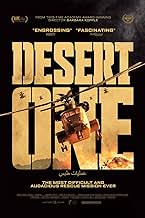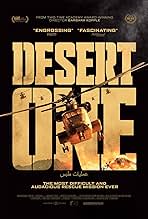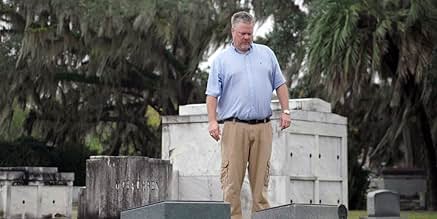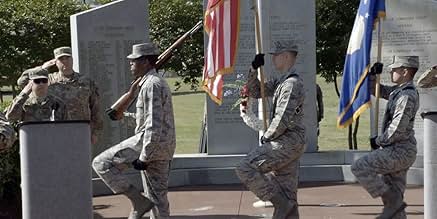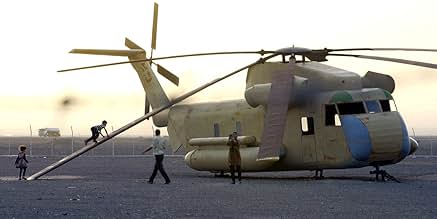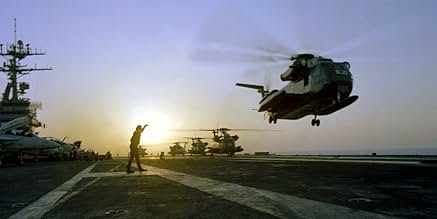Using new archival sources and unprecedented access, master documentarian Barbara Kopple reveals the story behind one of the most daring rescues in modern US history: a secret mission to fre... Read allUsing new archival sources and unprecedented access, master documentarian Barbara Kopple reveals the story behind one of the most daring rescues in modern US history: a secret mission to free hostages of the 1979 Iranian revolution.Using new archival sources and unprecedented access, master documentarian Barbara Kopple reveals the story behind one of the most daring rescues in modern US history: a secret mission to free hostages of the 1979 Iranian revolution.
- Awards
- 1 nomination total
James Q. Roberts
- Self - U.S. Army
- (as Maj James O. Roberts)
John Pustay
- Self - Deputy to Chairman, Joint Chiefs of Staff
- (as LTG John Putsay)
Kenneth Bancroft
- Self - U.S. Air Force
- (as TSgt Kenneth Bancroft)
Lewis Burruss
- Self - Delta Force
- (as Maj Lewis "Bucky" Burruss)
William G. Boykin
- Self - Delta Force
- (as Maj William G. Boykin)
Bucky Buchanan
- Self - U.S. Marine Corps
- (as SSgt Bucky Buchanan)
John Sigman
- Self - U.S. Marine Corps
- (as GySgt John Sigman)
Ed Seiffert
- Self - U.S. Marine Corps
- (as Col Ed Seiffert)
- Director
- Writer
- All cast & crew
- Production, box office & more at IMDbPro
Featured review
One of the great tragedies in the history of U. S. military operations outside of an actual war itself was the attempt in April 1980 by the U. S. Special Forces unit known as the Delta Force to effect a rescue of the personnel being held at our besieged embassy in Teheran, Iran. The operation, known as Eagle Claw, owing to a lack of foresight at the highest levels, was both well-intentioned and, sadly, misconceived; and owing to two of the eight helicopters involved in that operation malfunctioning, plus a blinding sandstorm in the Iranian desert, resulted in the deaths of eight U. S. servicemen on April 24, 1980, and prolonged the Iranian hostage crisis until January 20, 1981.
DESERT ONE, a 2019 documentary directed by Barbara Kopple, the legendary documentary filmmaker responsible for, among many classic docs, 1976's HARLAN COUNTY U. S. A., and 2006's DIXIE CHICKS: SHUT UP AND SING, takes a look at the lead-up to this event, including America's turbulent relationship with Iran, one which went rocky in 1953 when Iran's then-leader, and democratically elected prime minister, Mohammed Mosadegh was overthrown and killed in a violent CIA-sponsored coup. This resulted in the ascension of Reza Pahlavi, the "Shah", to power in Iran, where he was for all intents and purposes a "toady" for the United States. But in 1979, the Shah was overthrown by the Ayatollah Khomeni; and on November 4th of that year, radical students inspired by Khomeni seized the American embassy, holding fifty-two American diplomats hostage. This prompted then-President Jimmy Carter to instigate Operation Eagle Claw. The intent was to hatch a raid seemingly similar to Israel's 1976 Entebbe rescue mission. Its failure, and the deaths of the eight servicemen, dealt a blow to American prestige and morale, prolonged the hostage crisis, doomed Carter's re-election chances in 1980, and led to Ronald Reagan's ascension to the presidency.
In DESERT ONE, we get interviews with both Carter and his vice-president Walter Mondale, as well as interviews with former CIA director Robert Gates; legendary ABC newsman Ted Koppel (whose "Nightline" followed the Tehran hostage crisis from start to finish, and would become a fixture on ABC's late night programming for decades to come); and many of the embassy hostages and surviving members of Operation Eagle Claw (Michael Metrinko; James Q. Roberts; Ed Seiffert), as well as recorded telephone conversations between President Carter and Charles Beckwith, the legendary special forces commander responsible for the creation of Delta Force, of what was happening with the mission as it was unfolding and, unfortunately, fatally unraveling. Much of what emerges from DESERT ONE is the realization that dealing with what we call Middle East radicalism (especially when, in the case of Iran, it's something that our own government foments) and, eventually, terrorism is not nearly as cut-and-dried as we may have wanted to think it was.
But what also emerges is the fact that a group of good men at least had the guts to try and rescue our personnel from the hellhole they found themselves put in by the takeover of the embassy; and they deserve all the credit, the praise, and the commendations from We The People that they can get.
DESERT ONE, a 2019 documentary directed by Barbara Kopple, the legendary documentary filmmaker responsible for, among many classic docs, 1976's HARLAN COUNTY U. S. A., and 2006's DIXIE CHICKS: SHUT UP AND SING, takes a look at the lead-up to this event, including America's turbulent relationship with Iran, one which went rocky in 1953 when Iran's then-leader, and democratically elected prime minister, Mohammed Mosadegh was overthrown and killed in a violent CIA-sponsored coup. This resulted in the ascension of Reza Pahlavi, the "Shah", to power in Iran, where he was for all intents and purposes a "toady" for the United States. But in 1979, the Shah was overthrown by the Ayatollah Khomeni; and on November 4th of that year, radical students inspired by Khomeni seized the American embassy, holding fifty-two American diplomats hostage. This prompted then-President Jimmy Carter to instigate Operation Eagle Claw. The intent was to hatch a raid seemingly similar to Israel's 1976 Entebbe rescue mission. Its failure, and the deaths of the eight servicemen, dealt a blow to American prestige and morale, prolonged the hostage crisis, doomed Carter's re-election chances in 1980, and led to Ronald Reagan's ascension to the presidency.
In DESERT ONE, we get interviews with both Carter and his vice-president Walter Mondale, as well as interviews with former CIA director Robert Gates; legendary ABC newsman Ted Koppel (whose "Nightline" followed the Tehran hostage crisis from start to finish, and would become a fixture on ABC's late night programming for decades to come); and many of the embassy hostages and surviving members of Operation Eagle Claw (Michael Metrinko; James Q. Roberts; Ed Seiffert), as well as recorded telephone conversations between President Carter and Charles Beckwith, the legendary special forces commander responsible for the creation of Delta Force, of what was happening with the mission as it was unfolding and, unfortunately, fatally unraveling. Much of what emerges from DESERT ONE is the realization that dealing with what we call Middle East radicalism (especially when, in the case of Iran, it's something that our own government foments) and, eventually, terrorism is not nearly as cut-and-dried as we may have wanted to think it was.
But what also emerges is the fact that a group of good men at least had the guts to try and rescue our personnel from the hellhole they found themselves put in by the takeover of the embassy; and they deserve all the credit, the praise, and the commendations from We The People that they can get.
Storyline
Did you know
- GoofsThe occupants of the C130 are looking out of the left-hand paratroop door at the fire; someone closes the door but it slides left to right. The paratroop door opens vertically, so it should slide down to close.
- Quotes
Jimmy Carter: Do you have any report on the helicopter's location?
- ConnectionsReferences ABC News Nightline (1979)
Details
- Release date
- Country of origin
- Official site
- Languages
- Also known as
- Desert One - Gidseldramaet i Teheran
- Filming locations
- Production companies
- See more company credits at IMDbPro
Box office
- Budget
- $1,500,000 (estimated)
- Runtime1 hour 48 minutes
- Color
Contribute to this page
Suggest an edit or add missing content









